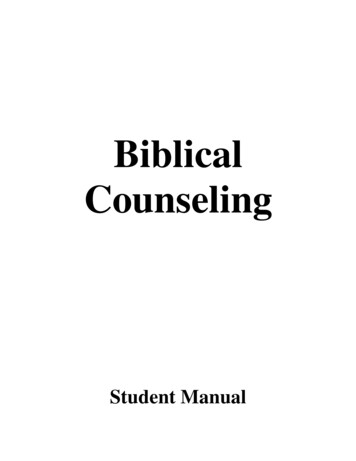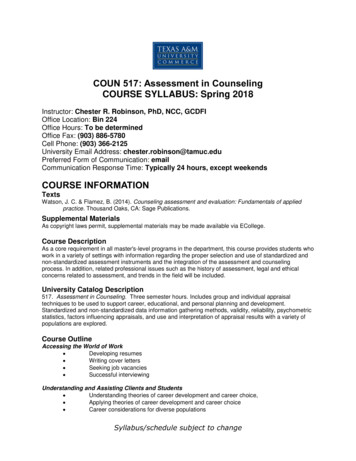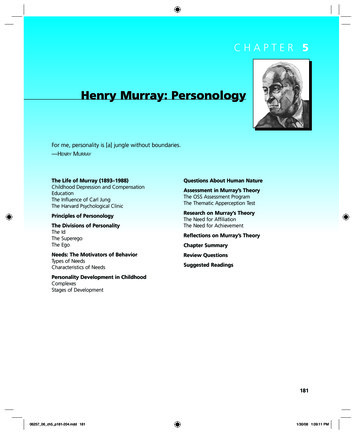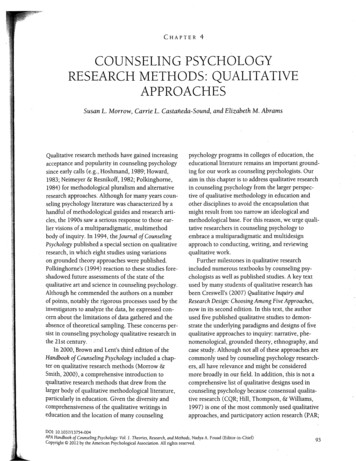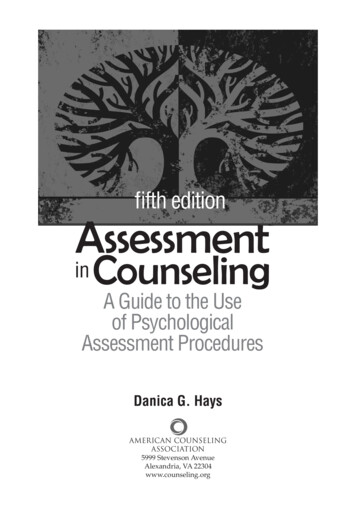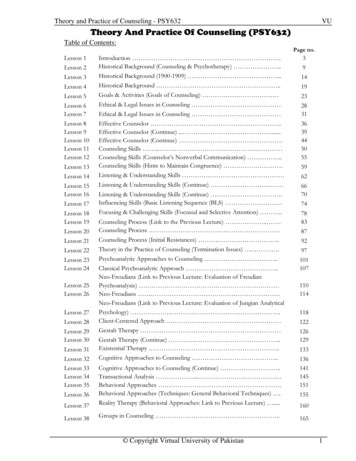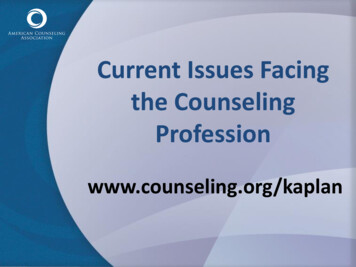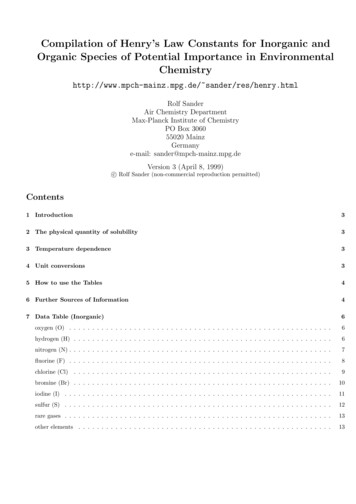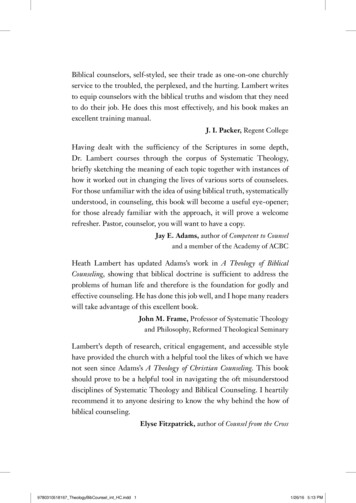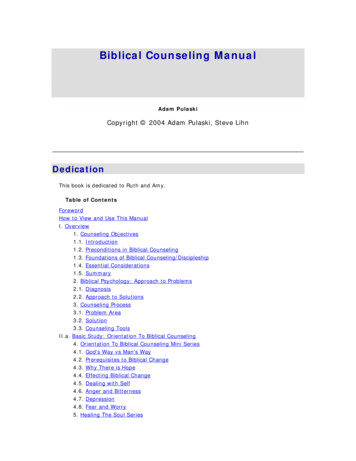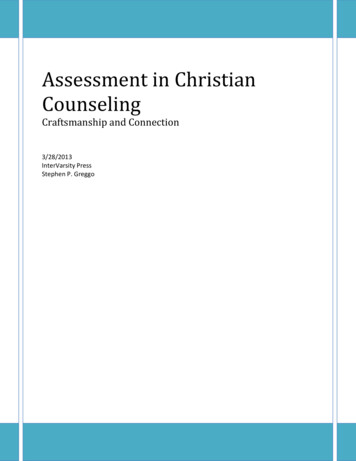
Transcription
Assessment in ChristianCounselingCraftsmanship and Connection3/28/2013InterVarsity PressStephen P. Greggo
Assessment Basics for Christian Counseling1ContentsChapter 1Assessment Basics for Christian Counseling . 5From Technology to Conversation . 5Assessment: Hearing the Cry of the Heart. 7Central Assumptions: The Search for Wisdom . 7Assessment is Therapeutic Conversation . 8Assessment is a Strategic and Systematic Search . 9Assessment is Communication that Opens Hearts . 11Counseling: In Search of a Definition . 11Counseling that is Christian . 12Preparing the Heart of the Counselor. 15Enter Scripture Devotionally . 19Explore Scripture in Community . 20Examine Scripture to Develop Fluency in Biblical Theology . 21Expand Access to Biblical Passages Relevant to Client Concerns . 24Exhibit Suitable Scriptural Expertise in Special Presentations . 26References . 28Chapter 2Defining the Assessment Task. 31Envisioning Best Practice . 31Locating Targets for Change . 31Assessment Dimensions . 31Details: Observe and Assemble . 31Dynamics: Patterns and Persons. 31Dependence: Empowerment and Submission . 31Clarifying Terms . 31Psychological testing . 31Psychological assessment . 31Tools for Clinical Care . 31Contrasting Applications . 31References . 31Chapter 3: Forming a Theological Foundation . 32
Assessment Basics for Christian Counseling2Demonstrating the Craft of Assessment . 32A Theology for Assessment . 38Craftsmanship. 38A Discerning Heart . 41Discovering Wisdom Afresh . 46Discerning Wisdom in Layers. 50Posture: Submissive to Triune God . 50Product: Recognize Special Revelation. 50Process: Dialogue with Christian Community and Doctrine . 53Person: Reflect Jesus Christ as Wisdom Incarnate . 54Potential: Eschatological Purpose, A Restored Human Soul . 54Assessment within Christian Counseling Approaches . 56References. 61Chapter 4: Integrity in Assessment Ethics. Error! Bookmark not defined.“Give me your tired, your poor, your huddled masses.” . Error! Bookmark not defined.Scientific Methods: Triumph or Travesty? . Error! Bookmark not defined.History Lessons . Error! Bookmark not defined.Be Informed about Assessment Approach Disputes . Error! Bookmark not defined.Evaluate Novel Methodology and Major Instrument Revisions . Error! Bookmark not defined.Remain Current on Ethical Codes and Standards for Assessment . Error! Bookmark not defined.Personalize Assessment Risk . Error! Bookmark not defined.Essential Elements of Measurement Scales . Error! Bookmark not defined.Conceptual model . Error! Bookmark not defined.Standardization . Error! Bookmark not defined.Reliability . Error! Bookmark not defined.Validity . Error! Bookmark not defined.Utility . Error! Bookmark not defined.Honest Scales . Error! Bookmark not defined.The Great Invitation . Error! Bookmark not defined.References. Error! Bookmark not defined.Chapter 5: The Case for Redemptive Validity . Error! Bookmark not defined.
Assessment Basics for Christian Counseling3Measures of Choice. Error! Bookmark not defined.Biblical Terminology: Testing, Proving and Tempting . Error! Bookmark not defined.Trends in the Measurement of Depression . Error! Bookmark not defined.Content Validity & Item Analysis through a Christian Lens . Error! Bookmark not defined.Construct Validity: Aligning Depression and a Heavy Heart . Error! Bookmark not defined.Criterion Validity: Exploring Matters of the Heart . Error! Bookmark not defined.Redemptive Validity and Tool Selection. Error! Bookmark not defined.References . Error! Bookmark not defined.Chapter 6: Craftsmanship in Conducting Interviews . Error! Bookmark not defined.Deep Waters, Rushing Streams: From Words to Wisdom . Error! Bookmark not defined.Interviewing and Connecting . Error! Bookmark not defined.Scientist-practitioners and Participant-observers . Error! Bookmark not defined.Formalities and Becoming Familiar . Error! Bookmark not defined.Data Resources . Error! Bookmark not defined.Counselors as Comforted-Comforters . Error! Bookmark not defined.Recognizing Spiritual Orientation . Error! Bookmark not defined.Extrinsic or Intrinsic Faith Orientation . Error! Bookmark not defined.Seeking or Dwelling Faith Orientation . Error! Bookmark not defined.Scripture or Experience Faith Orientation . Error! Bookmark not defined.Wise in Heart. Error! Bookmark not defined.References. Error! Bookmark not defined.Chapter 7: Connecting in Initial Consultations (START) . Error! Bookmark not defined.First Contact . Error! Bookmark not defined.Hospitality: Strangers, Guests and Friends . Error! Bookmark not defined.An Underlying Structure for Clinical Consultation . Error! Bookmark not defined.“S” is for capturing the client’s Story . Error! Bookmark not defined.“T” is for therapeutic alliance . Error! Bookmark not defined.“A” is for assessment . Error! Bookmark not defined.“R” is for recommendations . Error! Bookmark not defined.“T” is for treatment plan . Error! Bookmark not defined.Customize your START . Error! Bookmark not defined.
Assessment Basics for Christian Counseling4References . Error! Bookmark not defined.Appendix 1 . 63Clinical Assessment Instrument Christian Evaluation Form (CAICEF) . 63Appendix 2 . 68START Initial Consultation Report . 68
Assessment Basics for Christian Counseling5Chapter 1 Assessment Basics for Christian CounselingAll Scripture is God-breathed and is useful for teaching, rebuking, correcting and training inrighteousness, so that the servant of God may be thoroughly equipped for every good work(II Tim 3: 16-17).Theological Theme: Scripture as ‘norming norm.’From Technology to ConversationThe counselor paused. Phillip, a withdrawn and discouraged college student, adjusted inhis seat, wiggled to get comfortable and eventually made eye contact.1The counselor met hisgaze and smiled to engage him softly. Reaching towards Phil, the counselor passed over an I-padwith the Counseling Progress Check (CPC) open and ready (McMinn, 2012). This was the thirdweek that the duo had been meeting, so Phil accepted the device with a readiness for this openingroutine. “It is good to have you back Phil. As we have done in each session thus far, I wouldappreciate if you would show me how you have been feeling the past few days by using thetouch screen to complete this scale. This will direct us on where to focus.” Phil slid his fingerwith intentionality over the face of the I-Pad to select his response for each of the twelve items.Despite the deliberate attention that Phillip gave to each of his selections, the procedure took lessthan a minute.The counselor accepted the device back from Phil and immediately glanced at his ratings.“Well, thank you Phillip for sharing with me that you have been in the midst of anuncomfortable, emotionally distressing week. It is good that you are showing that you have beenpretty miserable. We will certainly explore those heavy experiences. At the same time, you areaware that you were not as far from God as you had reported last week. Let’s start by letting me1Clinical examples throughout this text are formed from case composites. All identifying features, particularly thedemographic elements, presenting concerns and treatment settings are combined, altered or exchanged. These arenot actual clients. The features under consideration are genuine and flow from clinical experience.
Assessment Basics for Christian Counseling6hear what happened to give you that sense of actually being closer to the Lord.” In response tothis invitation, Phil now returned the counselor’s delicate smile and began to share his story.Combining high-tech assessment technology with high-touch interpersonalcommunication is commonplace in helping relationships today. It is indeed critical to monitorprogress in vivid and valid ways for all invested parties to see. There are definite benefits tomarking off progress in the attainment of desired outcomes. In addition, clients like Phillip valuea concrete way to communicate. This active assessment enables folks like Phil to express wherehe’s been at physically, emotionally, socially and spiritually in tangible ways and with no words.The development of practical tools such as these is enormously exciting. Existing applicationspoint down the road to those soon to come. There are telltale signs that the future of counselingcare is now.It is my privilege to invest in training the next generation of Christian helpingprofessionals and pastoral caregivers on how to make the most of the wide range of assessmentmethods, tools and techniques that are currently available. In any and all helping relationships,opportunity brings responsibility. What criteria need to be in in crystal clear focus forpractitioners to be circumspect and judicious when making decisions about the application ofsuch technology? Are there essentials to keep in perspective to achieve the most valuable andproductive helping alliance possible? Most importantly, what do counselors and clients need tobear in mind and actually do so that God is the one glorified when assessment technology mergesinto counseling conversation. Considering each of these critical concerns to the fullest andpreparing clinicians to serve well in the wave of the future is the passion that drives this project.
Assessment Basics for Christian Counseling7Assessment: Hearing the Cry of the HeartAssessment done right can define, inform, and guide counseling endeavors frominception to conclusion. Assessment done to pursue righteousness –living and relating to pleaseGod -- inspires counselors to be responsible craftsmen who use the best available tools tofacilitate God-honoring change and worthy relational connections. Assessment can enhancecommunication as it furthers the decisive task of planning the helping effort’s purpose, goals andexit strategy. Assessment procedures can establish a built-in mechanism to evaluate how thepartnership is making proper headway towards the intended change. Viewed in this light,assessment becomes the pursuit of excellence in counseling and a mutual activity to enrich thetherapeutic alliance. It is of utmost importance to be prudent and proficient when applyingassessment technology. An astute assessment mindset and skillset are necessary to minimize risk,enhance benefit and to prevent worldview distortions. Let’s begin by visualizing the entireassessment process in conjunction with a search for wisdom.Central Assumptions: The Search for Wisdom1) Assessment is the means to activate effective therapeutic conversation (Pro. 1:7).2) Assessment is the diligent search using systematic techniques to secure insight,understanding and skills for living (Pro. 2 1-5).3) Assessment is the gateway to communication that enables the heart to hear (Pro. 3:1-6).These three statements encapsulate the central contentions bound into these pages. A thoroughgrasp of assessment is crucial to realize expectations and to ensure quality in contemporarycounseling and Christian soul care.Counseling within the Christian tradition launches a search for wisdom within a uniqueinterpersonal dialogue that nurtures the whole person. Its kingdom purpose is to condition the
Assessment Basics for Christian Counseling8heart to love God unconditionally and self in such a fruitful way that a Christ-like love for othersis sustained (Mt. 22:37-39; Ps. 4: 1-10; Ps 51: 10-17; Ps. 61:1-4). These underlying assumptionslink the assessment enterprise to familiar verses from the early portion of the book of Proverbswhere wisdom is personified and esteemed. This initial section of Proverbs establishes thebiblical framework for a Word-oriented and God-glorifying quest for deep and fulfillingdirection. Its first eight chapters define wisdom as the lead virtue to inform living so that it iscompletely consistent with a life that honors God. Each assessment premise is best understoodwhen placed with a corresponding message from Proverbs. This will bind the purpose ofassessment in helping conversations to Christian heart care as its ultimate intent.Assessment is Therapeutic ConversationAssessment activates effective therapeutic conversation (Pro. 1:7). When a helpingrelationship comes together, the conversation moves with intention to distinguish where changeis required. Assessment and discernment are parallel activities. Discernment in Proverbs depictsa heart yearning for wisdom and open to instruction (i.e. Pro. 1:5; 15:14; 18:15). Counseling is acollaborative effort where the essence of the exchange is to uncover the hidden matters of heartand use the grace of insight to adjust attitude and actions. The beginning of wisdom is nomystery in Scripture. The pre-requisite for knowledge and comprehensive understanding isrepeatedly declared to be an inner conviction regarding the fear of God (Job 28:28; Ecc. 12:13;Ps. 111:10; Pro. 2:5, 8:13, 9:10) (Hughes & Laney, 2001). In Scripture, such ‘fear’ is not apassing emotional state. It is a foundational, solemn declaration of utter dependence on the LordGod who is the sovereign source of absolutely everything. The starting point for wisdom is tobecome awestruck. That is, being aware of one’s humanity in the presence of a majestic,
Assessment Basics for Christian Counseling9heavenly Father. This instills a humble obedience to his standards. Fear of the Lord inspiresreverence for his will because his ways are recognized as true and just.What do sayings from ancient sages have to do with contemporary counseling andsophisticated assessment techniques? A helping relationship makes inquiries into life’s details,stories, priorities, expectations and relationships. This triggers earnest contemplation and ignitesan interior desire to grasp what is unknown. It stirs sensations of vulnerability and propels anurgency to revise misconceptions. Realignment of relational priorities is sure to follow. Thequalities and conditions of the helping relationship itself bring to the surface one’s innerreactions to the myth of autonomy and the reality of human dependency. Assessment not onlylooks at the client’s external situation and attitude about these conditions, it untangles theintricacies of therapeutic relationship itself to foster an effective and credible therapeuticalliance. The unrealistic hope for an idealized, affirming relationship is exchanged for one wheremisunderstandings naturally occur. What gives a therapeutic relationship a razor sharp edge iswhen assessment generates a ready means to identify and repair disruptions before a hurt ormisunderstanding begins to harden. Christians who counsel recognize that this human helpingrelationship is designed to represent a pure connection to the only true source of strength andstability. After all, wisdom secured may flow through the counselor, but is the Lord whoprovides. All blessings and good gifts are the redemptive benefits of the gospel.Assessment is a Strategic and Systematic SearchAssessment searches diligently to use systematic techniques to secure insight,understanding and skills for living (Pro. 2: 1-5).My son, if you accept my words and store up my commands within you, turning your earto wisdom and applying your heart to understanding— indeed, if you call out for insight
Assessment Basics for Christian Counseling10and cry aloud for understanding, and if you look for it as for silver and search for it as forhidden treasure, then you will understand the fear of the Lord and find the knowledge ofGod (Pro. 2:1-5, New International Version).There are powerful instructions and images packed tightly into these potent verses. Each uniquephrase identifies a characteristic that the seeker is summoned to exhibit. The one who searchesfor wisdom is to: soak-up good teaching; treasure compassionate direction and divinecommands; turn one’s ear to attend to wisdom; call upon the heart to comprehend; cry aloud forinsight; examine matters thoroughly and investigate one’s motives diligently. Locating thehidden cache of wisdom is compared to the production procedure that mines the earth for silver.This is nothing superficial about such an expedition. Mining can be strenuous, sweaty anddisciplined work. Locating valuable ore from within a mass of surrounding material requiresaccomplished systems and sturdy tools. The mining metaphor provokes images of intensive workconducted in close quarters, under adverse conditions and without a doubt, coping with elementsof risk. The activity takes effort, strategy, dedication and diligence. Whatever motivates orpressures a client to initially obtain assistance, in order for the partnership to be productive, therewill be mutual recognition on the level of determined effort that the digging will require. Activeand unflinching examination is required to formulate wisdom. This explains the routineinvitation that jumpstarts many counseling sessions: Where would you like to direct our worktoday? Assessment is a means through which the helping partnership focuses a united gaze on acollective search to surface valuable ore. The commodity of wisdom is a priceless resource thatbrings rich benefit to those in need.
Assessment Basics for Christian Counseling11Assessment is Communication that Opens HeartsAssessment is communication that enables the heart to hear (Pro. 3:1-6). Theseinstructions from Proverbs accentuate the value of godly teaching, commandments, andguidelines. When internalized, living wisely produces prosperity and peace. The offer withinthese verses is nothing shallow. This is no stingy, symptom-only, superficial relief. This isgenuine shalom - peace that surpasses all understanding. It is reflected in health, wholeness andwell-being. The heart - one’s inner thoughts, emotional ties, will and center of being - must bepenetrated until saturated with the Lord’s insight and perceptions. In counseling, helpingconversation is pursued with an extraordinary effort to provide customized care. Suchpersonalized nourishment makes use of dynamic relational resources to soften the heart, open themind to hear and move holistically towards shalom. “Trust in the Lord with all your heart andlean not on your own understanding” is a reference that returns the reader to the main theme, fearof the Lord (Pro. 3:5). By grace, wisdom compels us to honor the relationship at the center of ourheart and soul. This is done by loving the Lord our God with our whole heart, soul, mind andstrength.Counseling: In Search of a DefinitionIt is important before exploring the purpose and principles of assessment to have a firmunderstanding of what is meant by broad term ‘counseling.’ The label applies in numeroussettings; can reference an infinite range of discussion topics; and can reflect an assortment ofroles and helping arrangements. For starters, ponder this official, twenty-one word definitionestablished from within the profession of counseling. This wording was established by thirtyrenowned counseling experts who invested a year into this communication exercise. Asystematic, Delphi research procedure was utilized to arrive at consensus. “Counseling is a
Assessment Basics for Christian Counseling12professional relationship that empowers diverse individuals, families and groups to accomplishmental health, wellness, education and career goals (Rollins, 2010).” Three notable features areworth exploring.In counseling, the relationship itself has articulated boundaries and assigned roles. It is adeliberate and openly delineated affiliation. The phrase ‘professional relationship’ asserts a keyoverarching consideration. That is, an agreed upon set of ethical boundaries and procedures willgovern the undertaking. Secondly, counseling by design intends to benefit, equip and increasethe recipient’s experience of personal power. One or more participants in the counselingarrangement are to be on the receiving end of the pact. Third, counseling determines toaccomplish a particular purpose. No matter how these essential components are organized orwhere the emphasis is placed, an intentional relationship with penetrating talk to equip andaccomplish goals ultimately depends upon quality assessment. For simplicity, and to have an allencompassing definition of counseling that is as conducive to ministry as it is to genericcounseling, here is the working characterization that will apply. Counseling is strategic dialoguewithin a defined relationship to cultivate growth.Counseling that is ChristianThe aim throughout these chapters is to consider information collection procedures asthey apply to a variety of counseling settings and as practiced by mental health professionals(MHPs). A basic list of MHPs would include credentialed counselors, social workers,psychologists, marriage and family therapists and other health care providers. In addition,Christian counseling functions as an umbrella term to reference talk-based care offered bypastors, biblical counselors, chaplains, and ministry leaders (Powlison, 2010; Collins, 2007;Mahoney & Augsberger, 2007). Churches and other organizations with conservative roots and
Assessment Basics for Christian Counseling13evangelical commitments tend to favor the use of this identifier over that of a close cousin,pastoral counseling. Of course, the label pastoral counseling is used informally to reference anysupportive service conducted by clergy or lay leaders functioning in a pastoral role (McMinn,Staley, Webb & Seegobin, 2010)). It also can have a more restricted meaning. Those within thehelping professions associate this heading with a specific approach that has a lengthy historydating back more than half a century (AAPC, 2011).Reverend Anton Boisen, founder of the Clinical Pastoral Education movement (CPE),sought to reverse the unwavering secular trend in psychiatry. Boisen envisioned that CPE wouldequip ministers to furnish clinical assistance that addressed moral, religious and spiritual matters.Faith was to be esteemed as an asset, not as a liability, indication of pathology or reflection ofpersonal weakness. Notice the implication for assessment in this shift of perspective. Does apastor-clinician categorize faith as an asset or liability? For those who provide pastoralcounseling services, there is a proscribed training sequence and necessary supervised fieldexperience. Pastoral counselors seek to provide sound psychological therapy that is thoughtfullycombined with a spiritual and relig
Assessment Basics for Christian Counseling 1 Contents . Assessment done right can define, inform, and guide counseling endeavors from inception to conclusion. Assessment done to pursue righteousness –living and relating to please . The pre-r
